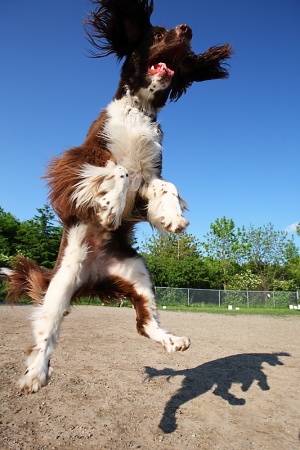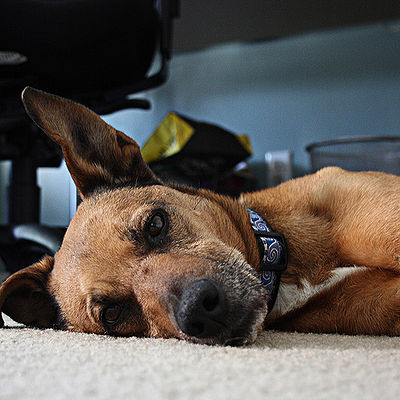
Most puppies and young dogs have loads of high energy. People often mistakenly use the term “hyperactive” to describe their behavior.
Before labeling your dog hyperactive, he/she should be seen by a veterinarian to make sure it is not a medical problem. Symptoms can include constant motion, being restless in the extreme, tail chasing, frantic movements. This doesn’t mean your dog is hyperactive, but it’s always a good idea to check what you think may be abnormal behavior to see if there is some underlying cause.
It’s very important to research the breed of dog you are interested in beforehand. Consider your lifestyle – do you love the outdoors and sports or are you content to putter around the house and watch some TV?
Many dogs are bred to lead active, working lives and require long periods of exercise to run off some the energy. Other breeds can be just as happy as “couch potatoes.” If you want to adopt a shelter dog (good for you) try to observe the dog’s behavior, ask questions. Armed with this information, you can make wise choices for you and your soon to be best friend.
Once your dog is home, begin training. It’s important for your dog to know simple commands such as sit, stay and come when called. In order to keep your dog interested, make training periods short, 10-15 minutes each. For the extra-energy dog you can set aside several training periods daily.
Every dog needs exercise and at least a daily walk. If your dog is very active, a couple of long walks, a trip to a dog park, a run, are all positive ways to use that energy.
Train and enter your active dog in sporting and agility events. These stimulate mind and body.
Stimulate your dog’s mind with puzzle toys. Provide lots of safe chew toys, keeping in mind your dog’s size.
One of the best pieces of equipment for your dog is a crate. Your dog might not realize it, but he/she needs to rest sometimes. Especially for high energy dogs, the crate can offer sanctuary and can be a place to calm down.
Check the ingredients in your dog’s food. Today there are so many natural foods and treats to choose from. Opt for a food without artificial preservatives, artificial colors and/or flavorings. While there is controversy over whether these ingredients cause hyperactivity, they are not food and not healthy. Never feed your dog sugary treats.
A holistic veterinarian can advise you as to calming supplements if necessary. Your dog’s size and weight will allow the vet to determine dosage.
Sadly, too many dogs end up abandoned or in shelters because people don’t understand the nature of each breed. Do your research so that you and your dog will enjoy many happy years together.



